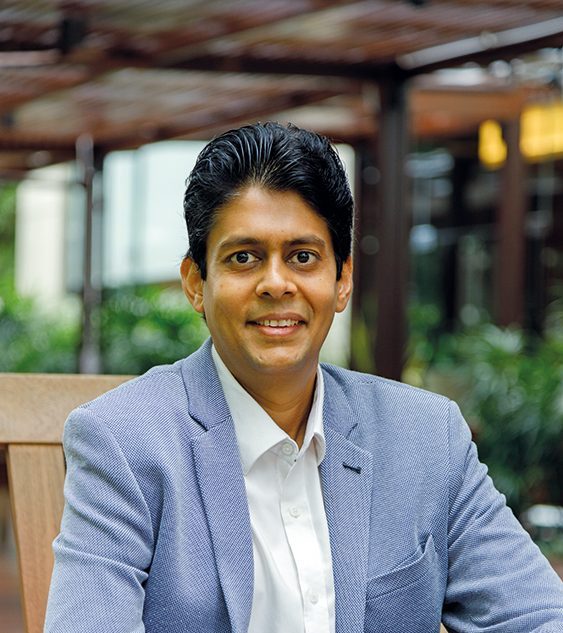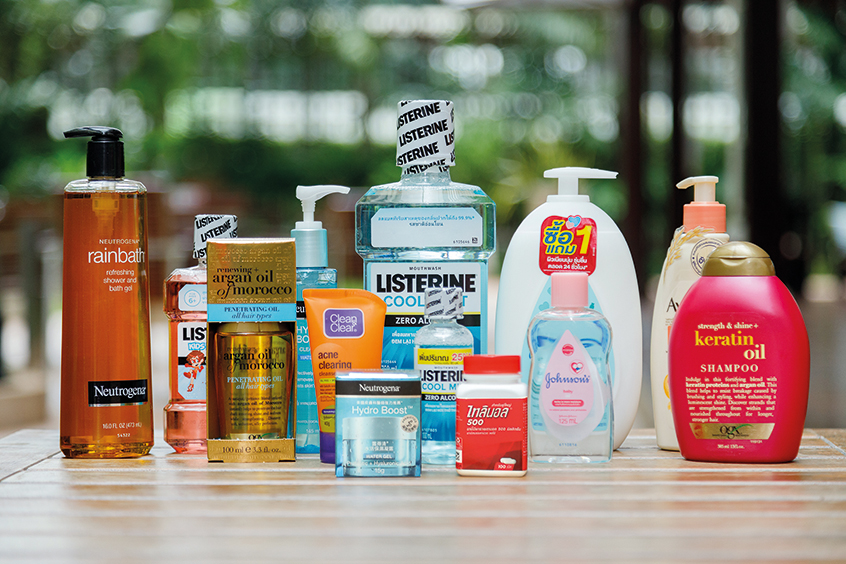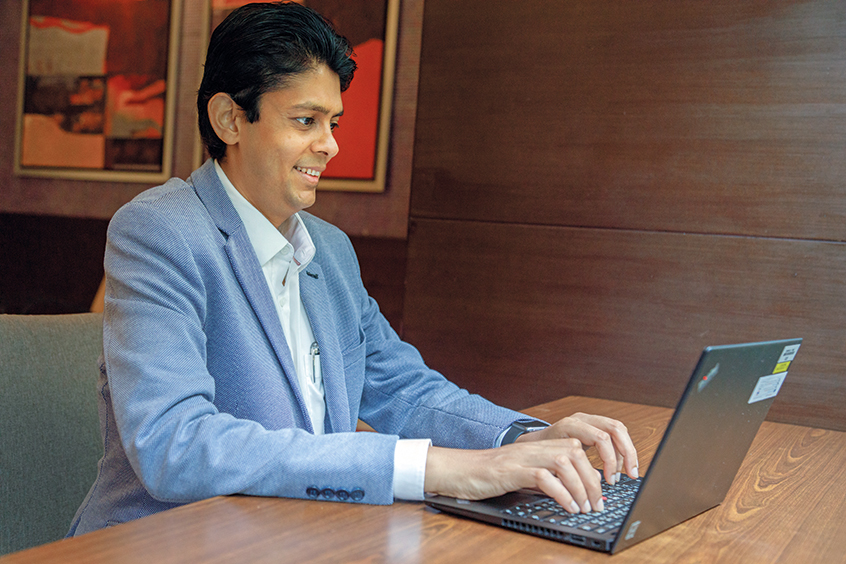How he continues to build relationships while on the top shelf.
By Aiden Jewelle Gonzales
Unlike the rapid pace of his world of fast-moving consumer goods (FMCGs), Ravi Bordia is someone who likes to take his time with building genuine relationships and solid foundations. Having taken the helm of Johnson & Johnson (J&J)’s Consumer Health business in Thailand during the height of the COVID-19 pandemic, he’s seen each curveball thrown at him over the past year as an opportunity. “Although moving during COVID and going through two lockdowns has been challenging, it’s been a fantastic learning experience for both my family and me,” he enthuses. “I’ve been doing the role remotely since April of last year, but only moved to Thailand in September. I wouldn’t say it was intimidating, but the task wasn’t easy. My excitement in the opportunity was in how to work with the teams here to drive positive change. I had to make a conscious effort to build relationships early, even via Zoom and MS Teams, because when you’re coming in as a new leader, people are expecting changes to happen, so how you take people along on that journey is key.”
Born in Dhanbad, India, Ravi’s peripatetic background spanned New Zealand, Australia, Papua New Guinea, and Singapore. He credits this with his appreciation for different cultures and environments, one that he’s also instilled in his two children. “I have to thank my parents for providing my brother and me with those varied experiences,” he tells me. “It’s been a big driver of making sure that my kids get that exposure and ability to interact with people from different cultures.” Finally settling in Australia to do his Bachelor’s of Commerce at the University of Sydney before doing his MBA at the University of Technology Sydney, Ravi cites that time of his life as one of transition and uncertainty, where he worked the full range of industries and jobs. “My first job was a telemarketing sales consultant, selling hotel membership packages to absolute strangers,” he recalls. “It was tough, and it built character and a thick skin because of all the interesting responses you get over the phone,” he says with a laugh. “After that job, you learn to handle rejection a lot better.”
Following his Bachelor’s, Ravi worked in odd jobs in Australia and India while waiting for his Australian permanent residency, ranging from media, to advertising, to hospitality. “I landed an analyst role at Goodman Fielder in Sydney in 2006, my first real break in FMCG businesses, and I haven’t looked back since. I’ve worked at Reckitt Benckiser, at Diageo, both in Sydney and in Singapore, and then Kimberly-Clark, before joining J&J in Singapore in 2015.” When asked about why he feels so drawn to the FMCG industry, he extols its dynamic nature and his love for the in-store experience: “Seeing how consumers choose one brand over another, understanding the in-store environment, and learning the drivers of purchase is uber-exciting for me.” He laughingly admits, “Even now, when I go to stores with my kids, they know to come with me to the shopping aisles and make sure products are facing the right way, and if there’s an opportunity to sell a J&J product to a shopper, Papa’s going to take it.”
As for why he’s so loyal to J&J, Ravi is candid about his desire to join a healthcare-related company that “cares about each other, and the roles we have in our respective communities and with our stakeholders: the patients, the doctors, our consumers, and our business partners.” Indeed, as one of the world’s most valuable companies, J&J has a long history of involvement in worldwide healthcare efforts, including, more recently, the development of a one-shot COVID-19 vaccine. When I ask him the question on everyone’s minds – when is the J&J vaccine coming to Thailand – he regretfully informs me that it’s not his jurisdiction, and he’s not in a position to comment.
Specifically, he explains, his current role is overseeing J&J’s Consumer Health businesses in Thailand, Laos, Cambodia, and Myanmar, which include household-name products such as Listerine, Johnson’s Baby, Neutrogena, and Tylenol. His variety of previous roles, however, have given him “a new perspective and great foundation in how commercial operations are run. Working with all sorts of people, from diverse backgrounds, genders, and cultures, has been the true appeal of learning how to build high-performing teams in complex work environments.”
Since he’s taken the helm in Thailand, Ravi’s focus has been on building both team spirit and a shared mindset, and he’s candid about the significant impact the last year and a half has had on Thailand’s consumption, after years of 4-6 percent consumption growth. “During this period, it’s about managing complexity and handling change. Those have been the core drivers of the decisions I’ve taken,” he explains.
“We’ve had to look at the breadth of the business and ensured that we’re adapting to the changing retail landscape.” I ask him if J&J has suffered less because of its stake in certain essentials, and he tells me that at the end of the day, the brands that have learned to survive are those that are adaptable, regardless of what sector they’re in. “Change and complexity are becoming the norm, and we need an Agile mindset to handle that, and make sure you’re retaining the right talent.” Like many other companies, he reveals that J&J has also had to pivot over the last year. “We’ve had to make tough choices on prioritising where we can invest, ways to motivate our teams, and ensure that everyone in the organisation supports what we’re going to execute.”
I ask him about his role as a leader during this time, and he stresses the importance of empathy towards one’s teams. “People are going through a lot professionally and personally; we’ve all had to adapt to new ways of working. Demonstrating that genuine care is an integral element of leadership, as well as the ability to actively listen. The other piece is providing clarity on expectations. A lot of times you have very good people in your teams who get frustrated because they get mixed messages, or they’re not clear on what’s expected of them.
“And, at the end of the day, you need to make sure your teams have fun. I make it a ritual within our teams to do things a little differently, do spur-of-the-moment activities, whether it’s exercise, or” – and here he chuckles self deprecatingly – “leadership dance routines. It’s important to take time to connect on a personal level and build true, authentic relationships.
“One sacrifice you have to make as a leader is to get out of your comfort zone –to get into those environments that give you butterflies in your stomach. When you do, you start to realise skills and the ability to manage in ways that you wouldn’t have otherwise. My motto with my teams is fairly simple: ‘everything is possible, as long as you follow up, follow up, and follow up.’ I personally don’t shy away from opportunities, and what I’m most proud of is never giving up. Things have not always been fantastic in my career, and I’ve learned that there’s no such thing as a free lunch in life. You have to work hard, learn every day, be authentic in your personal and professional life, and be clear on what your priorities are. That journey has been my biggest accomplishment to date, together with becoming a parent.”
One such example of grabbing opportunity when he sees it has been Ravi’s move to Thailand, and despite its current struggles, he nevertheless still waxes eloquent on its tremendous opportunities. “It’s a beautiful country, with wonderful people, and lots to see and do. In FMCG, the challenges and the opportunities in Thailand are similar – how to drive domestic consumption, and not just rely on international tourism to drive most categories and sectors.”
However, not every move has been as smooth, and Ravi recalls a year of transition when he had to dig deep: “When I moved from Australia to Singapore, I was moving with a very young family, to a completely different environment, and during my second day of work, my boss who hired me resigned, and the company announced a restructure. The next few months were very tough, and I only got through it with strong family support, especially from my wife Nidhi, who’s been so strong, independent, and practical, and is the reason that I’ve been able to explore so many opportunities. The other thing I learned at that time was to have that self-belief that if you just continue to work hard, things will happen.”
As for how he maintains a good work/life balance, Ravi is very clear about the importance of carving out time for his family. “Early on in my career, and with most of my stakeholders, I’ve been transparent that after becoming a parent, I needed some rules that are now part of my working rhythm. I switch off anywhere between 6-6.30pm for family time, which is something I also encourage my teams to do. I will then log back on once the kids are asleep.
“The other piece is exercise – it used to be nice to do when I could find the time, and now it’s becoming a must-have. It’s important to find time to exercise, play sports, and get some downtime with friends and family.”
When I ask him about new horizons for the future, he tells me, “Another sacrifice I’ve had to make is, it’s hard to build 3-5 year plans on the horizon in these sorts of roles. My wife and I stopped building mid-to-long-term plans a while ago, and we tend live each day as it comes.” Before he signs off, however, he expresses a wish that’s on all our minds: “One thing I have missed, however, is planning for holidays. I’d love to go back to doing that again.”
All photos were taken at Sukhumvit Park, Bangkok – Marriott Executive Apartments.








